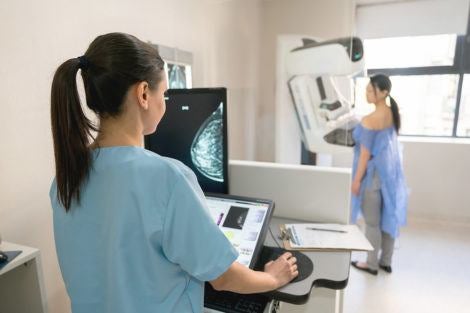October 28, 2019—Researchers at Harvard T.H. Chan School of Public Health and Harvard University have received a grant from the National Institutes of Health’s National Cancer Institute to fund the creation of an implementation science center focused on cancer control equity. The award is through the NCI’s Cancer Moonshot program, which aims to speed the rate of improvements in prevention, detection, and access to therapies.
The new Implementation Science Center for Cancer Control Equity will be led by Karen Emmons, professor of social and behavioral sciences and Elsie Taveras, executive director of the Kraft Center for Community Health and division chief, General Academic Pediatrics, at Massachusetts General Hospital, Conrad Taff Professor of Nutrition in the Department of Pediatrics, Harvard Medical School, and professor in the Department of Nutrition at Harvard Chan School.
The Center will partner with the Massachusetts League for Community Health Centers to develop sustainable strategies for ensuring that all patients have access to evidence-based cancer prevention. One of six implementation science centers funded by NIH in September, the Center focuses its efforts on improving cancer control equity.
While there are disparities in outcomes for patients with all types of cancers, they are far more prevalent in preventable cancers such as cervical, lung, and colorectal, Emmons said. “There’s a pattern that occurs over and over again. When an early detection or prevention strategy such as colonoscopy is developed, there is less uptake in settings that serve more vulnerable populations, and then we start to see differences in cancer outcomes by characteristics like race, ethnicity, and income.” Through the new initiative, Emmons and her team hope to identify strategies that will help community health centers identify and address barriers to care.
Their efforts will be aided by a population health management platform used by more than half of the Commonwealth’s 51 community health centers. The platform is integrated with electronic medical records at the centers and will allow researchers to obtain a big picture view of care—and gaps—across the system. Initial pilot projects will look at whether encouraging patients to be screened for both breast cancer and colorectal cancer will increase usage of both procedures and be more efficient for staff, and at ways to improve implementation of evidence-based cancer prevention interventions around nutrition, physical activity, and tobacco through partnerships between health centers and community organizations.
Emmons said that while she and her colleagues hope to help their community health center partners build their capacity to design studies and implement new strategies, the learning will be a two-way street. “We will learn from them how they are working with other resources in their communities, and how they’re innovating,” she said.
Ultimately, Emmons hopes that the Center will help develop strategies that can be sustained at their partner sites and scaled up more broadly in conjunction with other Implementation Science Centers across the country.
Photo: iStock
